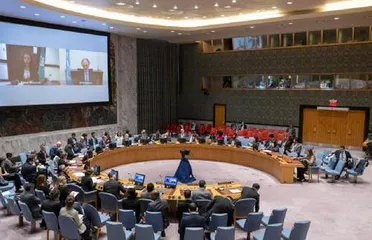Global South: An Important Driving Forcefor the Evolution of the International Order
作者: Niu Haibin

Since the beginning of the 21stcentury, the international orderhas witnessed a notable shift marked by an increasingly active involvement of the Global South in global affairs. This engagement has effectively curtailed hegemonism, Cold War mentalities, and camp poli- tics. The Global South is committed to fostering a more just, reasonable, equal, and representative international order, aspiring to earn a more peace- ful, stable, and conducive external environment for sustainable develop- ment. In pursuit of these goals, Global South countries have forged a robust community of solidarity and mutual assistance. This united front holds the power to influence global politics and economies, actively contributing to the establishment of an equitable, prosperous, and sustainable world.
EMERGING FORCES IN GLOBALPOLITICS
The Global South emerged within the era of global politics as a new identity and worldview that champi- ons global thinking and coordinated action. It believes challenges can be effectively addressed only through collaborative global efforts. The rise of the Global South has significantly contributed to the overall globaliza- tion and a more inclusive and equita- ble international order.
Viewed through the lens of inter- national politics and economics, the Global South, a product of non-alignment and the Third World, maintains a legacy grounded in anti-colonialism, anti-imperialism, and anti-hegemony. In 1991, the UN General Assembly passed the Challenge to the South: Re- port of the South Commission urging Global South countries to take con- certed actions worldwide. The concept of the Global South gains traction as people recognize the global presence of Emerging Market and Developing Countries (EMDCs) whose agenda is an important part of modern global politics. In the meantime, Global South countries, emerging as a collective force, go beyond borders to address development issues, voice global con- cerns,and undertake tangible actions.
In recent years, the Global South has witnessed a rapid increase in in- fluence, emerging as a new political actor. This growth can be attributed to internal factors (enhanced capabili- ties, and political awakening) and ex- ternal factors (a new phase of globali- zation, and escalating international competition).
Internally, EMDCs have increas- ingly become pivotal drivers of global economy and essential contributors, and even leaders, in global govern- ance. In 2023, the African Union gained entry into the G20, while the BRICS Summit 2023 agreed to admit Argentina, Egypt, Ethiopia, Iran, Saudi Arabia, and the United Arab Emirates. The African Peace Mission actively promoted the peaceful resolution of the Ukrainian crisis. The Global South advocated for attention to thehumanitarian crisis in the Palestinian- Israeli conflict. These latest develop- ments showcase growth of global influence of the Global South. Addi- tionally, emerging multilateral devel- opment financing institutions such as the Asian Infrastructure Investment Bank and the New Development Bank are giving more priority to the developmental needs of Global South countries.
Externally, as the international power structure becomes increasingly diversified, the West and the United States are seeking to secure support from the Global South to reinforce its dominant or advantageous position in the international order. To secure their dominance, they strategically posi- tionedEMDCs, including China, at the lower rungs of the global industrial and value chains. This was achieved through the dismantling of neo-liberal globalization and adjustments to the globalization model amid a trend of tribalization. The United States and the West are enhancing their influence in the Global South by establishing ideological connections, promoting “near-shoring” and “friendly shoring” and launching global infrastructure initiatives. Although the Global South countries welcome resources from the United States and the West, they still choose an open world economic system, the international order and multilateral cooperation represented by the United Nations over economic protectionism and pan-security repre- sented by the West.
GLOBAL SOUTH VIEW ONINTERNATIONAL ORDER
The Global South possesses not only the economic foundation for sus- tainable development but also the po- litical inclination to advance towards a just and equitable international order. This grants a unique advantage and role to the Global South in resolving international conflicts, promoting global development, addressing cli- mate change, and advocating dialogue among civilizations.
I. Pursuing Peaceful Transforma- tion
The end of the Cold War did not usher in lasting global peace. Neo- interventionism and NATO’s eastward expansion have heightened geopo- litical tension and turmoil, causing a sharp decline in political mutual trust and security cooperation intentions among major powers. Despite the per- sistent threat of terrorism, the United States, aiming to preserve itshegem- onic position, listed major power com- petition as the foremost threat in its national security strategy in the post- Cold War era. The U.S. seeks to main- tain a long-term competitive advan- tage over China and contain Russia.
The Global South treasures interna- tional security based on the UN Char- ter, underscoring the importance of the peaceful settlement of international disputes. Multilateral mechanisms dedicated to global and regional secu- rity governance, such as the Shanghai Cooperation Organization and BRICS, are making beneficial endeavors in this respect. The Shanghai Coopera- tion Organization, focusing on regional security threats, has included countries with territorial disputes, such as India and Pakistan, as members. Saudi Arabia and Iran were invited to join BRICS fol- lowing their reconciliation.